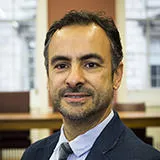17 November 2022
Transnational Law Institute launches Global Project on Authoritarianism
Experts from around the world gathered at The Dickson Poon School of Law last week to launch a new project looking at the recent tendency towards autocratisation in a number of countries, and different forms of resistance to this phenomenon.

On 10 and 11 November, the Transnational Law Institute (TLI) welcomed distinguished academics from all over the world to launch a new project, The Consortium on Global Resistance to Authoritarian Diffusion (GRAD).
The project will study authoritarian developments in selected countries and the domestic and international resistance to them. The event heard presentations on recent developments in Brazil, China, Hungary, India, South Africa and the United States, and on sanctions, transnational human rights resistance to authoritarianism and the political economy of autocratisation.

Professor Octavio Ferraz, co-Director of the Transnational Law Institute (TLI), said: “It was great to welcome friends from the US, Brazil, Hungary, India, South Africa and China to the first event of GRAD. Resistance to autocratisation is not only an important topic but one which lawyers are particularly well placed to study.”
The GRAD Consortium is supported by the initial GRAD Partners: the TLI, based at The Dickson Poon School of Law, King’s College London; the Fundação Getúlio Vargas Law School in Sao Paulo (FGVLAW-SP), the University of Wisconsin Law School (UW), and the Project on Autocratic Legalism (PAL), an International Research Collaborative (IRC) within the Law and Society Association.
Fabio de Sa e Silva, Assistant Professor of International Studies & Wick Cary Professor of Brazilian Studies at the University of Oklahoma, said: “There is plenty of writing on autocratisation processes and democratic decline, but not enough on legal resistance to those processes, and that is why this project is unique.”
Professor Oscar Vilheha Vieira, Professor of Constitutional Law and Dean at FGV São Paulo Law School, agreed: “The growing number of people living in countries going through a process of autocratisation since 2011 is scary. There is no doubt we live in a democratic crisis.”

